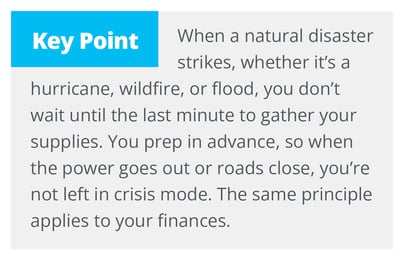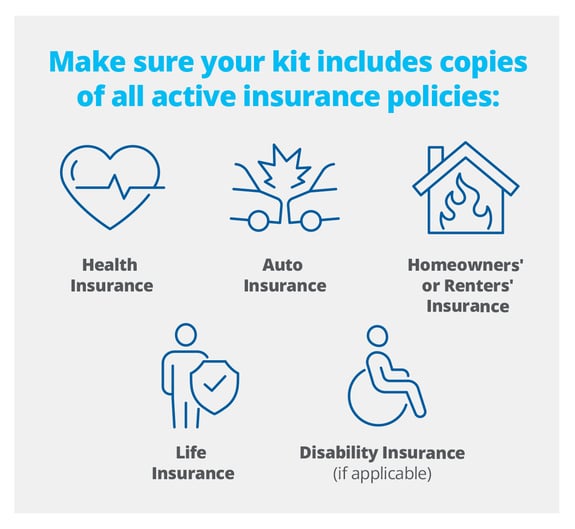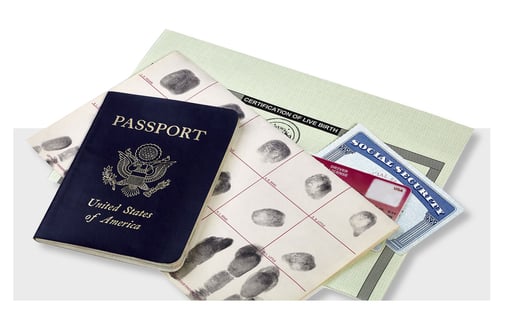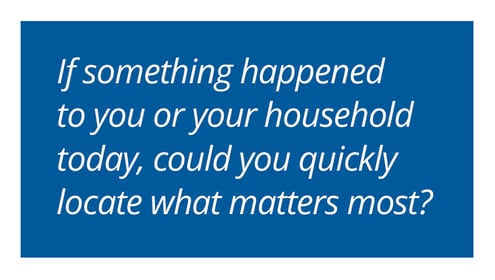Table of Contents
1. When Disaster Strikes, Are You Financially Ready?
2. The 5 Essentials in Your Financial First Aid Kit
3. Are You Ready?
Just like you'd pack batteries, water, and flashlights for a hurricane or wildfire, you need to prepare financially for life’s “storms.” Natural disasters are unpredictable, and so are financial ones like job loss, medical bills, or unexpected repairs. When thinking about your financial preparedness, do you have all of your financial essentials accessible in one place? Financial emergencies rarely give warning, so creating your financial first aid kit matters just as much as having an umbrella when it rains.
When Disaster Strikes, Are You Financially Ready?
When a natural disaster strikes, whether it’s a hurricane, wildfire, or flood, you don’t wait until the last minute to gather your supplies. You prep in advance, so when the power goes out or roads close, you’re not left in crisis mode. The same principle applies to your finances.
Financial emergencies might not come with weather alerts, but they can hit just as hard. A sudden job loss, a medical diagnosis, or an unexpected car repair can throw your entire budget into chaos. And if you’re unprepared, that chaos can quickly turn into costly decisions, mounting debt, and long-term stress.
That’s why building a financial first aid kit isn’t just thinking ahead; it’s a necessity. It gives you a sense of control when everything else feels uncertain. Instead of scrambling to find passwords, insurance paperwork, or emergency funds, you’ll know exactly where to turn. You’ll have a plan, a backup, and peace of mind.
Let’s be honest: most of us wouldn’t wait for a wildfire to be on our doorstep before packing an emergency bag. So why wait for a financial emergency to get organized? At Addition Financial Credit Union, we believe that preparing for life’s what-ifs is a form of empowerment. You don’t need to predict the future; you just need to be ready for it.
What would you do if a financial emergency hit tomorrow? Would you be ready, or scrambling?
In the next section, we’ll walk you through the five essentials every member should have ready in their financial first aid kit, so when life gets unpredictable, your finances don’t have to be.
The 5 Essentials in Your Financial First Aid Kit
You are ready to pack up your kit before disaster strikes. What are the most important things to grab?
Emergency Cash and Savings Access
When a hurricane hits, no one wants to rely on credit cards for bottled water and gas. In a natural disaster, access to real, spendable cash is often what gets you through the first few critical days. The same applies in a financial emergency.
Whether you’ve just lost your job, need a costly car repair, or face an unexpected medical bill, having liquid savings gives you the ability to act quickly without digging yourself deeper into debt. Credit cards can be helpful, but they come with interest rates and stress. Cash gives you options and breathing room.
Experts typically recommend having at least one month’s worth of essential expenses readily available. This includes rent or mortgage payments, utilities, groceries, gas, and insurance. If you can eventually work your way up to three to six months, even better, but the key is to start somewhere now.
Where should you keep the money? Not under your mattress, and not mixed in with your checking account. The best place for your emergency savings is in a separate, high-yield savings account or a money market account that is easily accessible in a true emergency, but far enough out of reach that you’re not tempted to dip into it for everyday spending.
At Addition Financial Credit Union, we offer savings tools designed for just this kind of preparation. Whether it’s an automatic transfer to your emergency savings account each payday or setting up alerts to track your balance, we make it easier to build your financial buffer without even thinking about it.
Key question for this essential item: Is your emergency fund easily accessible, but not too easy to spend?
Think of this as your financial flashlight during a power outage, simple, essential, and possibly the difference between weathering the storm or being caught off guard.
Insurance Policies and Contacts
When a natural disaster hits, one of the first things people check, after ensuring their safety, is their insurance coverage. Do we have flood insurance? What’s our deductible? Who do we call to file a claim? In the heat of the moment, you don’t want to be searching for answers. The same goes for a financial emergency.
Your insurance documents are one of the most vital parts of your financial first aid kit. Whether it’s health insurance for a sudden medical emergency, auto insurance after a collision, or life insurance for your family’s protection, these policies are your financial lifelines when the unexpected happens.
Make sure your kit includes copies of all active insurance policies:

Also include up-to-date contact information for each provider: agents, claims departments, and online access portals. When time is critical, you want one folder (physical or digital) that holds everything.
In an emergency, time is everything. Scrambling to log into your insurance portal or find an agent’s phone number slows you down and increases stress. Having your documents and contact info neatly organized means you can focus on taking action, not trying to reset your password. Are you covered enough? Are your beneficiaries updated? These questions matter.
Key question for this essential item: Do you know where all your insurance policies are, and who to call when you need them?
Think of this part of your kit like your weather radio during a storm. It doesn’t stop the winds from blowing, but it keeps you connected to the help you need when things go wrong.
Important Legal and ID Documents
When a wildfire threatens your neighborhood, you’re told to grab your most important documents: birth certificates, passports, Social Security cards. The same mindset applies to financial emergencies. If something happened to you or your household today, could you quickly locate what matters most?
Your financial first aid kit should include copies of essential legal and identification documents, so you’re not caught off guard when a hospital, government agency, or insurance provider asks for proof of who you are or what you own

What to include in your kit:
- Social Security cards (for all household members)
- Driver’s licenses or state IDs
- Passports
- Birth and marriage certificates
- Mortgage or lease agreements
- Vehicle titles
- Wills or healthcare directives
- Power of attorney documents
These documents may not feel urgent until they are. If you're ever hospitalized, displaced, or managing someone else's affairs, access to this paperwork can make an overwhelming situation manageable.
Key question for this essential item: If you lost your wallet or had to evacuate in 10 minutes, would you have what you need to prove your identity, access your accounts, or make legal decisions?
Think of this part of your kit like your evacuation map. You hope you never need it, but when you do, nothing else can replace it.
Secure Access to Financial Accounts
Imagine the power’s out, you're on the road, and you need to transfer funds, pay a bill, or check your balance. Would you know how to do it, and would someone you trust be able to help if you couldn't?
When you're in crisis mode, access to your financial accounts becomes more than a convenience; it’s a make-or-break. Whether you’re managing medical bills, unexpected travel expenses, or disrupted income, knowing how to get into your accounts quickly and securely can prevent the situation from getting worse.
What to include in your financial access document:
- A list of all active financial accounts (checking, savings, credit cards, loans)
- Login information for online banking and bill pay (stored securely)
- Contact numbers for each financial institution
- Notes on monthly payment due dates or autopay settings
- Information about any shared access or power of attorney permissions
Use a password manager to organize sensitive login credentials, and keep a written backup in your emergency file (stored safely). Consider giving a trusted family member or legal representative access in case you’re unable to manage things yourself.
Addition Financial offers secure digital banking tools to help you monitor accounts, pay bills, and move money anytime, anywhere, because in a crisis, accessibility matters.
Key question for this essential item: Are you confident that someone else could manage your finances temporarily if something happened to you?
This section of your kit is like your emergency phone charger. It won’t prevent the problem, but it keeps you connected when everything else feels uncertain.
A Financial Contact & Support Plan
No one goes through a natural disaster alone. We lean on neighbors, community centers, and emergency responders. The same support system should exist for your finances.
When a crisis hits, you don’t just need documents; you need people. Someone to talk to you through your options, help you make informed decisions, or simply reassure you that you're not in this alone.
That’s why your financial first aid kit should include a support plan, some sort of list of contacts and resources that can guide you during tough times.
What to include:
- Your financial advisor’s name and contact info
- Addition Financial Credit Union’s member services or branch contact
- Notes on available services: emergency loans, financial counseling, credit protection
- A backup contact: someone you trust who understands your finances (a spouse, sibling, or adult child)
Even if you never need to use this support plan, just knowing it exists gives you peace of mind. And if the unthinkable happens, you won’t be trying to navigate it all alone.
Key question for this essential item: Have you talked with a financial advisor or credit union representative about building your emergency plan?
This final piece of your kit is like the flashlight app on your phone - it lights the way forward when everything else goes dark.
Are You Ready?
While having the kit is important, you should also check and update your kit annually or after major life changes like a new job, marriage, or having a child. Don’t wait for a financial emergency to start preparing, and give yourself peace of mind knowing you have what you need together. If you need a little more motivation to put aside money or you are someone who does well with a specific template, try our free resource, Your Emergency Savings Plan Builder. In just a few steps, you’ll gain the clarity and confidence to face life’s surprises head-on without falling into debt or panic. If you’re thinking about putting more effort into saving and need more content on the topic, try our blog, “What’s Your Plan B? How to Build a Financial Safety Net for Life’s What-Ifs.” If you want to discuss your plan, our team at Addition is always ready to guide you toward financial success.
/AFCU_93-EmergencySavingsPlan-CTA.jpg?width=1143&height=262&name=AFCU_93-EmergencySavingsPlan-CTA.jpg)





/AFCU_93-EmergencySavingsPlan-CTA.jpg?width=1143&height=262&name=AFCU_93-EmergencySavingsPlan-CTA.jpg)